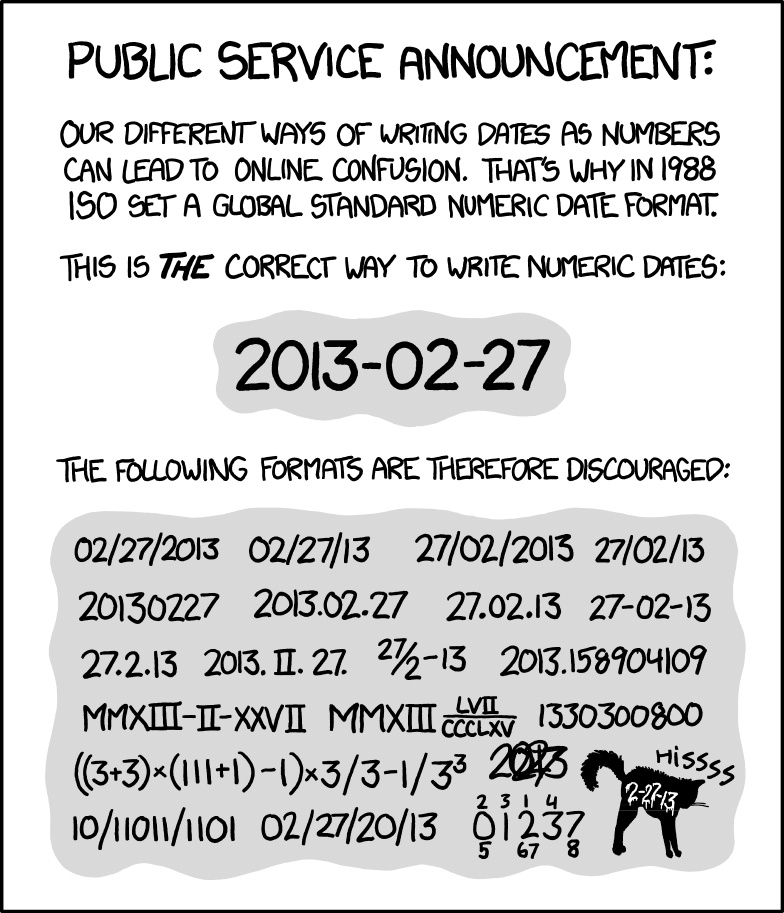I’m definitely in the “for almost everything” camp. It’s less ambiguous especially when you consider the DD/MM vs MM/DD nonsense between US dates vs elsewhere. Pretty much the only time I don’t use ISO-8601 is when I’m using non-numeric month names like when saying a date out loud.
In Canada we use MM/DD and DD/MM so you never quite know which it is! There’s an expense spreadsheet I fill out for work that uses one format in one place and the other format in another…
Hey, that sounds like my cloud storage providers auto billing system.
“Your auto renewal will draft on 08/09/23.”
Is that August 9th or September 8th? Literally depends on where the person you ask is in the world.
Holy cats, that sounds like a nightmare.
That would ruin my entire day
And you can do a simple sort on the combined number and youve sorted by date.
Yeah, it’s pretty much everything for me too. The biggest exception being when UI is involved and a longhand date format would be more friendly.
Friendly to who?
The time reapers

Can’t believe he missed the opportunity to add 41332 to the number of ways of how not to write dates.
I must be missing something.
Experience with excel.
I feel better that I don’t understand now.
Excel doesn’t display ISO dates unless you define a custom format.
Excel ::shudder::
They’re trying to make it look fake!
Everyone tries to make it look fake. Fuckers!
I recall writing a script that produces that 01237 with smaller digits around it for the current date. It lists the numbers that occur in the date (0, 2, 3 and 9 for 2023-09-09), the smaller digits show at which position they show up in a YYYYMMDD format (the 0 shows up on positions 2, 5 and 7)
The script has not been pushed online cause it was so dang bad
To the commenters justifying the written form MM-DD-YYYY on the basis of preferring to say the name of the month followed by the day (which the written numerical sequence does not preclude you from doing). If someone were to say something like “the time is a quarter to eleven” do you think they would have a case for writing it 45:10? And if so, how would you deal with the ambiguity of “ten past ten” if they wrote it 10:10 instead of 10:10?
better than the absolutely deranged MM/DD/YYYY and imo the best when it comes to international communication
deleted by creator
Now thats the kind of indoctrination of children I can get behind
It’s ISO8601
Year-Month-Day best everywhere
Upvoted because I appreciate the exposure for this dating method, but I personally use it for everything. Much clearer for a lot of reasons IMO. Biggest to smallest pretty much always makes the most sense.
Christ, do this many people really find iso8601 hard to read? It’s the date and the time with a T in the middle.
As long as they use letter for months, like Jul 09, 2013 its fine. Otherwise prefer a sorted timescale version. Either slow changing to fast changing yyyy mm dd or fast to slow dd mm yyyy.
Nah, letters bring another complexity - besides with them Feb gets sorted after Dec.
The letters make no sense to me. Like Jul, Jun, I’m constantly mixing them up. Give me a good solid number like 07 or 10. No mixing that up. Higher numbers come after lower numbers, simple as.
I think it’s fair that programmatic and human readable can be different. If someone is putting in the month word for a logging system they can fuck right off though
If someone is putting in the month word for a logging system they can fuck right off though
That way you can sort the months of the year, in order:
- April
- August
- December
- February
- January
- July
- June
- March
- May
- November
- September
2023-08-09: just read from the end. 9th August 2023.
what
I use it all the time when writing dates.
Not “many people.” Americans. Americans find it hard to read. I’m not 100% sure but I’m fairly certain everyone else in the world agrees that either day/month/year or year/month/day is the best way to clearly indicate a date. You know, because big to small. America believes month/day/year for some stupid fucking reason.
I am an American and I use it religiously for the record. Especially for version numbers. Major.minor.year.month.day.hour.minute-commit. It sorts easy, is specific, intuitive, and makes it clear which version you’re using/working on.
Because who cares what day it is without knowing the month first.
Who cares what month it is without knowing the year first
Who cares what year it is without knowing which dimension first
Who cares what dimension it is without knowing which timeline first
How often do you mentally need to update the month in your head though? I can literally tell you.
Ah yes, because all dates you see every day have to do with the current month
10 feels like an October…
Of course, don’t you forget the current month all the time? I know I do!
I actually do, and I know I’m not alone.
Day/month/year is not in the same category as y/m/d. That crap is so ambiguous. Is today August 9th? Or September 8th? Y/m/d to the rescue.
It’s only ambiguous to Americans.
Or anyone who has to work with Americans. Especially when you also work with other countries as well. You can’t assume dd/mm/yyyy or mm/dd/yyyy blindly in either case. yyyy-mm-dd solves the issue entirely because both sides at least agree that yyyy-dd-mm isn’t a thing.
You’re almost there, just use - instead of / and everyone knows what you mean
America believes month/day/year for some stupid fucking reason.
It’s because of Great Britain. We adopted it from them while a bunch of colonies and it regionally spread to others.
America didn’t change, probably because we have been so geographically isolated (relatively speaking), whereas the modern day UK did change to be more like Europe.
People get so goddamn hot and bothered by things that ultimately don’t matter almost like it is a culture war issue. Americans maintain the mm/dd/yyyy format because that’s how speak the dates.
I wouldn’t say it is us Americans who “find it hard to read” if someone from elsewhere in the world sees an American date, knows we date things in the old way they used to date things, and then loses their minds over having to swap day for month. Everyone just wants to be contrarian and circle jerk about ISO and such.
Us devs, on the other hand, absolutely should use the same format of yyyy-mm-dd plus time and time zone offset, as needed. There’s no reason, in this age, for dates to be culturally distinct in the tech space. Follow a machine-first standard and then convert just like we do with all other localizatons.
But hey, if people want to be pedantic, let’s talk about archaic gendered languages which are completely useless and has almost zero consistency.
Bruh even Britain uses day-month-year, even speaks them as “9th of September”.
“September 9th” doesn’t even make sense in English as there is only 1 September in a year.America did this.
There is no excusing that.
I’m pretty sure it’s because of the way we say it. Like, “May 6th, 2023”. So we write it 5/6/2023.
That said, I think it’s fucking stupid.
Yer, just like the most important day for the seppos… The 4th of July…
I will never stop being impressed by the absolute insanity that is British rhyming slang. Apparently I’ve never heard seppo before, short for septic tank, rhyming with Yank. I just learned a new mildy derogatory term for Americans, nice
In British English you say the date before the month as well. I know that even saying the month first sounds very jarring too me.
I’m not an American and English isn’t my first language, so the US way to write dates always confused me. Now, I finally understand it! Many thanks, this is legitimately sooooo useful!
Facts. The sorting system for files inevitably makes YYYY-MM-DD more optimal. I tried to resist but it doesn’t work.
It warms my heart to see so many comments in the camp of “I use it everywhere”. Absolutely same here. You are my people.
yyyy-mm-dd makes it much clearer about what fucking order things are in
Yeah if the day of the month is less than 12 and any other format is used it becomes a guessing game.
There are two ways of writting dates: the “yyyy-mm-dd” one and the wrong one
ISO 8601 ftw. Here’s the date, time, and duration for our next meeting:
2023-08-10T20:00:00PT2H30M
nearly forgot that 8601 has support for durations as well
It handles ambiguity too. Want to say something lasts for a period of 1 month without needing to bother checking how many days are in the current and next month?
P1M. Done. Want to be more explicit and say 30 days?P30D. Want to say it in hours? Add theTseparator:PT720H.I used this kind of notation all the time when exporting logged historical data from SCADA systems into a file whose name I wanted to quickly communicate the start of a log and how long it ran:
20230701T0000-07--P30D..v101_pressure.csv(“
--” is the ISO-8601 (2004) recommended substitute for “/” in file names)If anyone is interested, I made this Bash script to give me
uptimebut expressed as an ISO 8601 time period.$ bkuptime P2DT4H22M4S/2023-08-15T02:01:00+0000, 2 users, load average: 1.71, 0.87, 0.68
But where is a timezone?
Timezone is optional, and when missing is read as local time.
In my mind, default is UTC unless otherwise specified.
luckily Local time can be any timezone!
PT, Pacific time. /s
Nah MMDDYY for me fam
You are objectively wrong.
Yes, MM DD YY only makes sense when you’re speaking.
In written language it should always follow the order of smallest to largest, meaning day, month, and then year. Imo.
Though I personally try to use YYYY-MM-DD as much as possible in day to day life, if not applicable I use DD MM YYYY. YYYY-MM-DD of course doesn’t follow the order of smallest to largest, instead following the opposite order, though at least it has an order.
Largest to smallest is way more logical than smallest to largest. You start general and get more specific as you progress. It is in general a better approach to conveying information and cataloging data. Not just dates.
Yeah but if you’re communicating a date, then it’s likely that the larger chunks of time will match and can be ommitted, so it’s natural to go up the chain in until you hit the day/month/year that matches the current one. Although I guess that’d imply using minutes before hours… I guess you could go large to small and skip anything that matches too. Nvm lol
Yes, MM DD YY only makes sense when you’re speaking
For many people it doesn’t. It’s something that’s exclusive to the US. In British English it’s day before month when speaking.
It’s something that is taught in school as “remember that the Americans say date before month so you don’t get confused”. But in a business context it’s bloody annoying you don’t switch to the international standard.
Yes, we also do days first in Germany.
Like I replied to someone else in this thread: I wasn’t saying “it’s the only way that makes sense when speaking” I said “it only makes sense when speaking”. That doesn’t make any other way of saying dates make less sense when speaking though.
When does saying the month first ever help when you’re speaking? The month doesn’t change for like 30 days. The only thing that matters is dd which changes daily. If someone asks me what the date I’ll give them the day date and nothing else.
I don’t need to say it’s the 9th and watch them panic that maybe it’s January.
I don’t even know how to reply to this.
So if you made an appointment for the 2nd of September you’d tell 'em “yeah let’s meet on the 2nd” or “yeah let’s meet on the 245th” you’re gonna need the month somewhere.
Of course if it’s the same month it wouldn’t make a difference if you said “let’s meet on the 10th” or “let’s meet on the 10th of August” but if you’re making appointments for different months which in everyday life or in a work environment is not unusual you can’t just say “yeah the 2nd” and expect them to know which month. “Yeah you can expect delivery by the 4th”.
Tl;Dr:
I didn’t even say “it’s the only way to say it when speaking” I said “only makes sense when you’re speaking.” because in written form MM DD YY is just shit for everyone except Americans, to the point where context sometimes is the only saving grace. Vice versa applies.You only need to add the month if it’s not the current month. The same with the year.
Yep you’re 100% right. My job start date was miscommunicated because of this, they were like “you start on the 17th”… turns out it was the next month. Better than getting it wrong in the other direction though for sure!
It turns out I can label my files any way I like, thanks.
No, you can’t. Don’t bother locking the doors tonight, I’m coming in anyway.
Reported
The judge a few weeks later: “you did this because of WHAT?”
I’m the same in my heart, but my brain says YYYYMMDD
I like yyyy-mm-dd and dd/mm/yyyy
eww not ddmmyyyy
Go largest to smallest or smallest to largest. Not medium, small, large.
give me iso 8601 or give me death
Nah, for everything.
deleted by creator
deleted by creator























